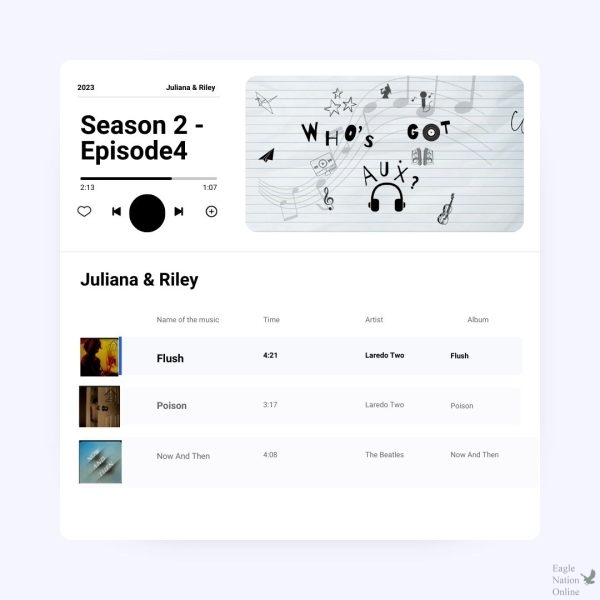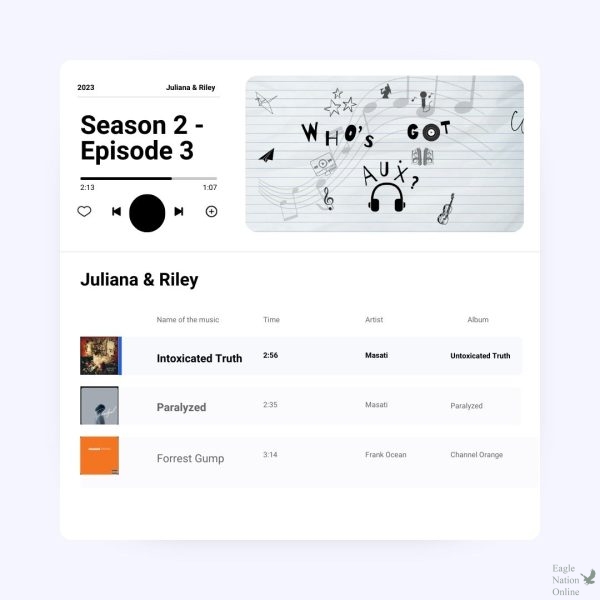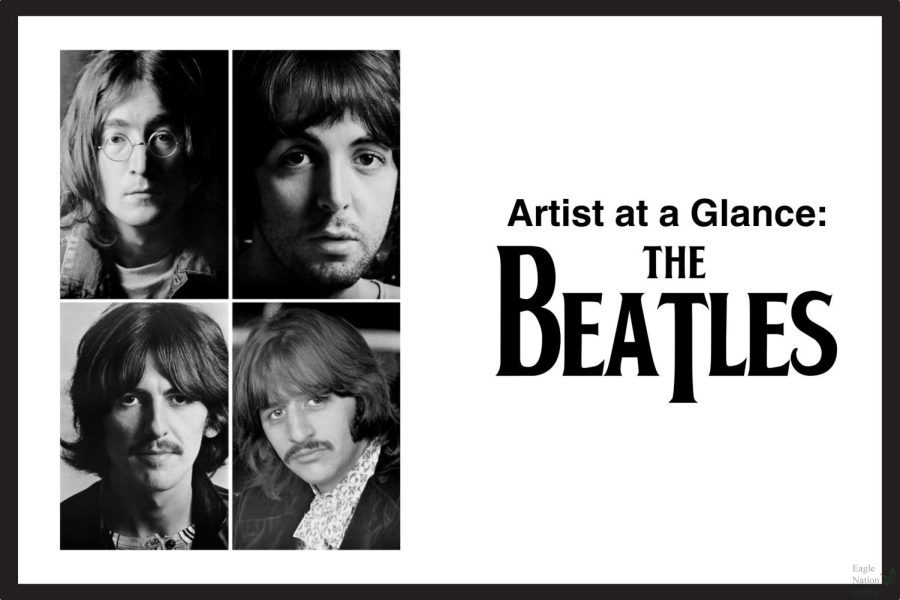Review: A glance at the work of The Beatles
Writer examines legacy of influential British rock band
The above graphic shows the four members of British rock band The Beatles side by side. In the attached review, podcast director sophomore Jake Radcliffe assesses the different “eras” of The Beatles. “The Beatles drastically changed music,” Radcliffe said. “They broke down barriers and changed the status quo of the music industry. Even though the band broke up decades ago, their impact can still be felt today, as their music continues to inspire and influence new generations of musicians and fans.” (Based on the The Beatles’ album “The Beatles,” Radcliffe created the digitally-constructed image using Canva.)
Editor’s Note: Some of the music linked may be blocked on the school’s WiFi.
Sixty years ago, four young men from Liverpool, United Kingdom, came together to form a legendary band that would transform music forever: The Beatles. Paul McCartney, John Lennon, George Harrison and Ringo Starr (born Richard Starkey) released their first album, “Please Please Me,” in 1963 and went on to release music until their break up in 1970. To celebrate the recent 60th anniversary of “Please Please Me,” I decided to review The Beatles’ works and the legacy they left behind.
‘The Early Era:’ 1963 – 1964
My Favorite Songs from this Era: “All My Loving,” “And I Love Her” and “Yesterday”
The albums “Please Please Me,” “With the Beatles,” “A Hard Day’s Night,” “Beatles for Sale” and “Help!” make up “The Early Era.” During this era, The Beatles showcased its infectious blend of pop, R&B and rock and roll to a worldwide audience for the first time. The first few albums of this period, “Please Please Me” and “With the Beatles,” are characterized by a mix of original compositions and covers of American R&B and rock songs, known for their tight harmonies and catchy hooks.
As this early era progressed, The Beatles began to experiment with more styles and sounds. This becomes especially evident in “A Hard Day’s Night,” “Beatles for Sale” and “Help!,” which incorporate the acoustic guitar and softer melodies. The band also began to explore more complex musical arrangements and techniques, which set the groundwork for their later avant-garde music.
“The Early Era” is my least favorite era of The Beatles. While the songs that came from this era are catchy and fun to listen to, most of them aren’t memorable. Also, during this time, the last songs of each album, which I believe should be one of the best songs on the album, were a bit lackluster and forgettable. However, this era still represents a crucial period in the band’s development as it honed its unique sound and established itself as a band that would be heard around the world.
‘The Middle Era’: 1965 – 1967
My Favorite Songs from this Era: “Girl,” “Here, There, and Everywhere” and “A Day in the Life”
The albums “Rubber Soul,” “Revolver” and “Sgt. Pepper’s Lonely Hearts Club Band” make up “The Middle Era.” During this period, the Beatles reached a new height with their music. Paul and John continued to excel at creating music, and George, who had made mediocre music up to this point, actually started writing good songs, such as “Taxman” and “Love You To.” George really pushed for the band to start using styles that weren’t popular in Western music at the time. Indian styles of music and their use of the sitar, a traditional Indian instrument, especially inspired him after he became fascinated with Eastern philosophy and culture.
The Beatles were able to become much more experimental with their music in this period due to their retirement from touring. Without the limits provided by the venues they toured at, the band could experiment with different ways of recording and new instruments. This caused the creativity of The Beatles’ music to skyrocket. They could use so many more avant-garde techniques that made for more interesting listens.
However, this caused the music from this period to be too focused on experimentation, which too often took away from the songwriting. Many listeners had a hard time enjoying the music because a lot of the songs didn’t have hooks or choruses, which can be essential in making songs memorable. The dense layers of production can also make these songs sound outdated to listeners today. The song “Tomorrow Never Knows,” which features heavily distorted guitar riffs and a droning, repetitive melody without a conventional hook or melody, exemplifies this criticism. All of the extra production on this song makes it less enjoyable to listeners who prefer more conventional music.
This era represents a major turning point in the history of popular music, setting a new standard for ambition and creativity in the medium. It also showcases the Beatles’ growth as musicians, producers and songwriters as they experiment with new techniques, sounds and genres.
‘The Late Era:’ 1968 – 1970
My Favorite Songs from this Era: “Happiness is a Warm Gun,” “While My Guitar Gently Weeps” and “Oh! Darling”
The albums “The Beatles,” – nicknamed “The White Album” because of the almost completely white design of the album’s cover – “Yellow Submarine,” “Abbey Road” and “Let It Be” make up “The Late Era.” During this era, The Beatles’ musical maturity reached its peak. Even Ringo, who didn’t tend to write music for The Beatles, wrote a few fun and catchy songs. The band took all that it had ever done before this point and expanded upon that, to make the best music it had ever created.
In this period, The Beatles showcased their pure versatility as musicians. From the variety of styles, genres and new techniques used in “The White Album,” to the fun listens that came out of “Yellow Submarine,” to the polished and cohesive sound of “Abbey Road,” to the raw and emotional quality of “Let It Be,” these albums demonstrate The Beatles’ ability to consistently push the boundaries of music and create timeless classics that have stood the test of time.
Although The Beatles were at their musical peak, some of the worst Beatles projects came out of this era. Over 10 of the songs from “The White Album” and “Let It Be” are bland and could even be considered annoying to listen to, such as “Wild Honey Pie” or “Dig It.” “Yellow Submarine” becomes boring to listen to in the second half of the album, in which none of the Beatles even perform in.
Even with the bad songs, “The Late Era” is my favorite era of The Beatles. Most of the songs on “The White Album” are really moving and memorable. “Abbey Road” embodies the perfect album, and even “Let It Be” has some really great moments. Without this era, The Beatles would not have attained the legendary status that fans remember them for today.
The Beatles’ effect on music
The band revolutionized the music industry in a variety of ways. The Beatles changed music through their songwriting. Instead of writing their music like the traditional pop music of the time, which tended to be more predictable and almost formulaic, they incorporated a wide range of styles into their songs, such as rock, folk, classical, and Indian music styles. The bandmates also pushed the boundaries of music production and recording techniques. They pioneered multi-track recording, overdubbing, using unconventional instruments, and other new techniques. Additionally, the band changed music through their influence on culture and social attitudes at the time. Their fashion and message of peace, love and social change defined the counterculture movement of the 1960s.
Overall, The Beatles drastically changed music. They broke down barriers and changed the status quo of the music industry. They transformed the sound of rock and roll, expanded the possibilities of music production – and shaped the culture of an entire generation. Even though the band broke up decades ago, their impact can still be felt today, as their music continues to inspire and influence new generations of musicians and fans.
Your donation will support the student journalists of Prosper High School. Your contribution will allow us to purchase equipment and cover our annual website hosting costs.















Neil • Apr 5, 2023 at 12:08 pm
What an amazing article. This absolutely fantabulous article has changed the entire direction of my life. The way the words flowed from the computer screen, and the amazing tone. My life is changed forever. Thank you for publishing this article. I will never forget this moment.